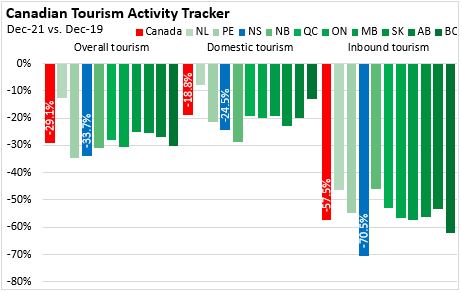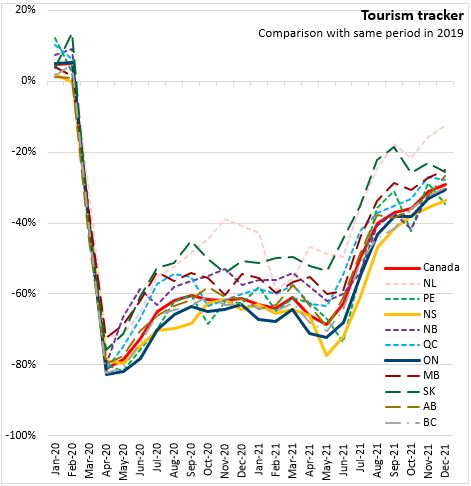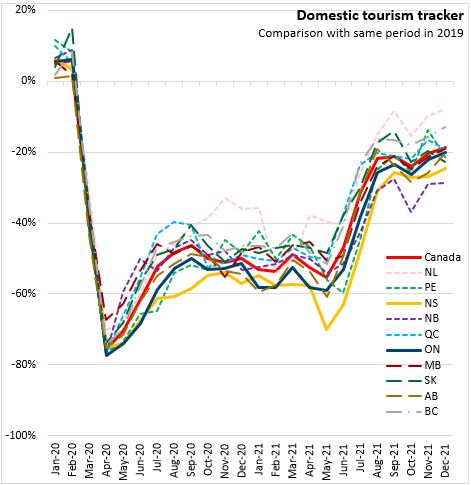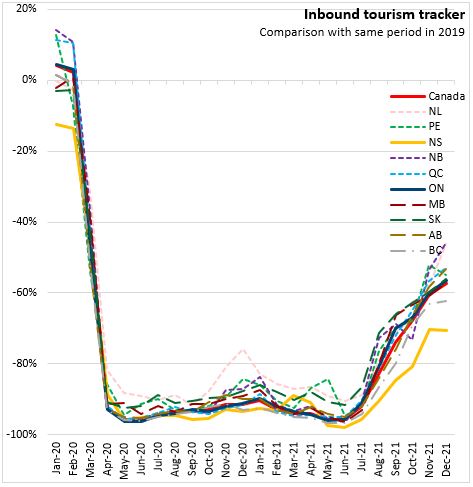The Economics and Statistics Division maintains archives of previous publications for accountability purposes, but makes no updates to keep these documents current with the latest data revisions from Statistics Canada. As a result, information in older documents may not be accurate. Please exercise caution when referring to older documents. For the latest information and historical data, please contact the individual listed to the right.
<--- Return to Archive
For additional information relating to this article, please contact:
March 04, 2022TOURISM ACTIVITY TRACKER, DECEMBER 2021 Statistics Canada's "Canadian Tourism Activity Tracker" illustrates the impacts of the COVID-19 pandemic on tourism activity. The data compares the latest reference period (December 2021) and the same period in 2019, prior to the pandemic. This provides a snapshot of how tourism activity has changed, including air travel, surface travel, hotels/accommodations, spending and trip duration. Tourism activity is monitored for both domestic travellers (those travelling within Canada, including within province more than 40 km from home) as well as inbound travellers from international sources. Overall tourism is estimated as a weighted average of domestic and inbound tourism activities.
At the end of April 2021, Nova Scotia implemented new travel and activity restrictions in response to another wave of COVID-19 infections. With these restrictions in place, Nova Scotia's tourism fell to 77.3% below May 2019 levels including a 70.2% decline in domestic activity and a 97.4% decline in international inbound activity (all were the largest declines among provinces for the month of May 2021).
Over the summer months restrictions were subsequently eased in Nova Scotia and around the country as vaccine coverage grew. There was a large rebound in domestic tourism activity through July and August. The federal government opened Canada's borders to all fully vaccinated foreign nationals for discretionary travel on September 7, 2021. With the reopening of Canada's borders, tourism activity continued to recover.
In December 2021, Nova Scotia's tourism activity was 33.7% below December 2019 levels. Domestic tourism activity was 24.5% below December 2019 levels. International inbound tourism activity in Nova Scotia was 70.5% below December 2019 levels (the largest such decline among provinces).
Domestic tourism activity improved in all provinces except Prince Edward Island, Quebec and Saskatchewan in December 2021. International inbound tourism activity improved in all provinces except Prince Edward Island and Nova Scotia.
Overall tourism activity in Canada was down 29.1% compared to December 2019. Newfoundland and Labrador (-12.5%) and Manitoba (-24.9%) report the least declines while Prince Edward Island (-34.6%) and Nova Scotia (-33.7%) report the largest.

With travel and activity restrictions at the start of the COVID-19 pandemic, tourism activity fell dramatically in all provinces. Activity partially recovered in the summer and fall of 2020, as domestic tourism started to grow again (international inbound tourism remained well below 2019 levels). Additional restrictions and travel limitations in the spring of 2021 reduced tourism activity again, particularly domestic tourism. As restrictions were eased in the summer of 2021, there was a sharp rebound in tourism activity across all provinces, driven primarily by domestic tourism. Tourism activity has been recovering at a slower pace since the summer of 2021.



Source: Statistics Canada. Table 24-10-0049-01 Canadian Tourism Activity Tracker and Grouped Data Sources, Canadian Tourism Activity Tracker
<--- Return to Archive